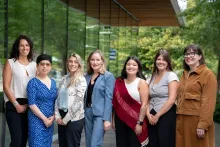
Improving diversity in health professional programs through mentorship, sleep disruption among night shift workers, Indigenous perspectives on aging in place, and better living after cancer—these are some of the topics that will be addressed by research projects which have been selected to receive a Health Innovation Funding Investment (HIFI) Award from UBC Health.
The 2023 HIFI Awards will enable 10 interdisciplinary health research teams to undertake innovative activities that have the potential to create change. Funded projects represent collaborations from different faculties across both Vancouver and Okanagan campuses.
The addition of a healthy aging stream this year, in partnership with the Edwin S.H. Leong Centre for Healthy Aging, is supporting seven of the teams to take an interdisciplinary approach to address health challenges related to aging.
Congratulations to all HIFI Award recipients.
HIFI Recipients 2023
GENERAL STREAM
Diversifying the UBC health professions education (D'HoPE): Interprofessional education and mentorship program dedicated to equity-denied youth
HIFI Award: $25,000
D’HoPE aims to increase the number and success of applicants from equity-denied groups to UBC health professions programs by fostering their knowledge and helping them feel that they belong and their perspectives are needed to advance the professions. Ultimately, increasing diversity in health professions will improve client/patient outcomes and health equity.
- Laura Yvonne Bulk, Assistant Professor of Teaching, Department of Occupational Science and Occupational Therapy, Faculty of Medicine
- Tal Jarus, Professor, Department of Occupational Science and Occupational Therapy, Faculty of Medicine
- Nassim Adhami, Lecturer, Undergraduate and Graduate Programs, School of Nursing, Faculty of Applied Science
- Michael Lee, Professor of Teaching, Department of Occupational Science and Occupational Therapy, Faculty of Medicine
- Amy Ellis, Assistant Professor of Teaching, Department of Physical Therapy, Faculty of Medicine
- Shahin Shirzad, Assistant Dean, Admissions, MD Undergraduate Program, Faculty of Medicine
- Catherine Macala, Associate Director, Admissions, MD Undergraduate Program, Faculty of Medicine
- Hanna Pahl, Master of Occupational Therapy Student, Department of Occupational Science and Occupational Therapy, Faculty of Medicine
- Kirby Way, Master of Occupational Therapy Student, Department of Occupational Science and Occupational Therapy, Faculty of Medicine
- Marie Nightbird, Assistant Professor of Teaching, School of Social Work, Faculty of Arts
- Kelly Allison, Assistant Professor of Teaching, School of Social Work, Faculty of Arts
- Jeff Boniface, Associate Academic Fieldwork Coordinator and Clinical Associate Professor, Department of Occupational Science and Occupational Therapy, Faculty of Medicine
- Ben Mortenson, Associate Professor, Department of Occupational Science and Occupational Therapy, Faculty of Medicine
- Elly Park, Assistant Professor of Teaching, Department of Occupational Science and Occupational Therapy, Faculty of Medicine
- Ranjit Kaur Dhari, Associate Professor of Teaching, School of Nursing, Faculty of Applied Science
- Marie Nightbird, Assistant Professor of Teaching, School of Social Work, Faculty of Arts
- Julia Schmidt, Assistant Professor, Department of Occupational Science and Occupational Therapy, Faculty of Medicine
- Jialin (Lydia) Chen, Assistant Manager of Curriculum and Programs, Faculty of Dentistry
- Damilola Mabadeje, Undergraduate Student, Integrated Sciences, Faculty of Science; D’HoPE Project Assistant, Department of Occupational Science and Occupational Therapy, Faculty of Medicine
- Katie Lee Bunting, Associate Professor of Teaching, Department of Occupational Science and Occupational Therapy, Faculty of Medicine
Identifying and developing policy responses to emerging forms of violence against health workers in Nigeria
HIFI Award: $25,000
This research project will produce: a peer-reviewed publication synthesizing knowledge globally regarding violence against healthcare workers; a peer-reviewed publication on stakeholder perspectives of violence against healthcare workers in Nigeria; and a virtual stakeholder meeting with key Nigerian stakeholders to discuss policy responses.
- Veena Sriram, Assistant Professor, School of Public Policy and Global Affairs, Faculty of Arts and School of Population and Public Health, Faculty of Medicine
- Annalee Yassi, Professor, School of Population and Public Health, Faculty of Medicine
- Katrina Plamondon, Assistant Professor, School of Nursing, Faculty of Health and Social Development, UBC Okanagan
- Ijeoma Okedo-Alex, Doctoral Student, School of Population and Public Health, Faculty of Medicine
Plasma metabolomic biomarkers for detecting heart allograft acute rejection
HIFI Award: $25,000
This study will be the first to use untargeted metabolomics to identify potential biomarkers that can predict heart transplant rejection, leading to more efficient, non-invasive, and cost-effective diagnosis and clinical management for heart transplant patients in North America. This health collaboration will generate important pilot data for future grant applications to continue this work.
- Scott J. Tebbutt, Professor, Department of Medicine, Faculty of Medicine
- Tao Huan, Assistant Professor, Department of Chemistry, Faculty of Science
- Chengliang Yang, Research Associate, Department of Medicine, Faculty of Medicine
- Casey P. Shannon, Director of Data Science, PROOF (Prevention of Organ Failure) Centre of Excellence, Department of Medicine, Faculty of Medicine
- Sara Assadian, Director of Clinical Research, PROOF (Prevention of Organ Failure) Centre of Excellence, Department of Medicine, Faculty of Medicine
- Linda Lapp, Postdoctoral Fellow, Department of Medicine, Faculty of Medicine
- Yukai Wang, Graduate Student, Department of Chemistry, Faculty of Science
- Paloma Burns, Clinical Research Manager, PROOF (Prevention of Organ Failure) Centre of Excellence, Department of Medicine, Faculty of Medicine
- Alyssa Hui, Lab Technician, Department of Chemistry, Faculty of Science
HEALTHY AGING STREAM
Sleep disruption, behavioural factors, and psychological stress as drivers of accelerated aging among night shift workers
HIFI Award: $25,000
This research project will establish a cross-faculty and cross-campus collaborative relationship that will drive novel research and training opportunities in the area of circadian disruption and healthy aging. The study aims to reveal valuable mechanistic insights and produce critical preliminary data with which to secure funding for future large-scale studies of preventative interventions.
- Parveen Bhatti, Associate Professor, School of Population and Public Health, Faculty of Medicine
- Nancy Sin, Associate Professor, Department of Psychology, Faculty of Arts
- Najib Ayas, Associate Professor, Department of Medicine, Faculty of Medicine
- Brian Dalton, Assistant Professor, School of Health and Exercise Sciences, Faculty of Health and Social Development, UBC Okanagan
A patient-oriented and case-mix approach to understand drivers of health resource utilization among older adults at high risk of falls
HIFI Award: $25,000
This study will identify case-mixes of patients who have different cost trajectories (i.e., high, declining, increasing, etc.) to ascertain modifiable clinical factors that predict these trajectories. The interdisciplinary cross-campus research team will integrate patient experiences from its falls prevention patient partners to develop patient recommendations for targeting the modifiable factors.
- Jennifer Davis (Faddegon), Assistant Professor, Faculty of Management, UBC Okanagan
- Craig Mitton, Professor, School of Population and Public Health, Faculty of Medicine
- Linda Li, Professor, Department of Physical Therapy, Faculty of Medicine
- Teresa Liu-Ambrose, Professor, Department of Physical Therapy, Faculty of Medicine
- Ryan Falck, Postdoctoral Fellow, School of Biomedical Engineering, Faculty of Applied Science and Faculty of Medicine
- Ben Karnon, Master of Science Student, Department of Experimental Medicine, Faculty of Medicine
Better living after cancer in older Canadians: Identifying patient predictive markers of treatment response
HIFI Award: $25,000
This research project will combine genetics, statistical modelling, and medicine with patient engagement to develop a pre-treatment test which informs cancer patient risk of injury from radiotherapy. This project will act as pilot data for a Canadian Institutes of Health Research grant application to evaluate the pre-treatment test, to be used by patients and oncologists to reduce the incidence of debilitating complications, where no test exists, in a prospective clinical trial.
- Christina Haston, Professor, Department of Computer Science, Mathematics, Physics, and Statistics, Irving K. Barber Faculty of Science, UBC Okanagan
- Peter Watson, Professor, Pathology and Laboratory Medicine, Medicine
- Angela Lin, Clinical Assistant Professor, Department of Surgery, Faculty of Medicine
- Jeff Andrews, Associate Professor, Department of Computer Science, Mathematics, Physics, and Statistics, Irving K. Barber Faculty of Science, UBC Okanagan
- Jose Sapien, Postdoctoral Fellow, Department of Computer Science, Mathematics, Physics, and Statistics, Irving K. Barber Faculty of Science, UBC Okanagan
- Mitchell Wiebe, Graduate Student, Department of Computer Science, Mathematics, Physics, and Statistics, Irving K. Barber Faculty of Science, UBC Okanagan
- Agnes Sauter, BC Cancer Clinical Trials
Raise your voice: An in-depth exploration of family and resident council effectiveness in long-term care
HIFI Award: $25,000
This research project will collaboratively create a preliminary tool to define and assess family and resident council effectiveness in long-term care homes in BC, disseminate findings, and increase exposure of family and resident councils through a student-led documentary. This will serve as a first step in establishing a systematic process for the inclusion of family and resident voices in long-term care policy development and implementation.
- Farinaz Havaei, Assistant Professor, School of Nursing, Faculty of Applied Science
- Aleksandra Dulic, Associate Professor, Centre for Culture and Technology, Faculty of Creative and Critical Studies, UBC Okanagan
- Sabina Staempfli, PhD Student, School of Nursing, Faculty of Applied Science
Aging in place: A perspective from Indigenous older adults and Elders
HIFI Award: $25,000
Working alongside Indigenous communities, the research team will co-create knowledge on what aging-in-place means to Indigenous older adults. From a developed survey, the team will generate a Canadian data network of the physical, emotional, spiritual, and cultural needs of older Indigenous adults for healthy aging. The project team will co-develop stakeholder and community reports to inform Indigenous needs for aging in place.
- Jennifer Jakobi, Professor, Chair for Women in Science and Engineering, and Director of the Institute of Healthy Living and Chronic Disease Prevention, School of Health and Exercise Sciences, Faculty of Health and Social Development, UBC Okanagan
- Christiane Hoppmann, Professor and Canada Research Chair, Department of Psychology, Faculty of Arts
- Jon Corbett, Professor, Department of Community, Culture and Global Studies, Faculty of Irving K. Barber Faculty of Arts and Social Sciences and Director, Institute for Community Engaged Research, UBC Okanagan
- Maureen Ashe, Professor and Canada Research Chair in Community Mobility, Department of Family Practice, Faculty of Medicine
- Lee Allison Clark, Director of Health, Native Women’s Association of Canada
- Kate Crosby, Undergraduate Student, School of Health and Exercise Sciences, Faculty of Health and Social Development, UBC Okanagan
- Jill Williamson, Research Coordinator, Aging in Place Research Cluster, UBC Okanagan
Identification of a conjunctival-gut microbiome axis in age-related dry eye diseases
HIFI Award: $25,000
This research collaboration will: 1) develop novel protocols for the isolation and detection of conjunctival microbiome; and 2) produce pilot data on conjunctival-gut microbiome axis in age-related dry eye diseases. The pilot data will be used to support a Canadian Institutes of Health Research grant application on using ocular microbiome as a biomarker of dry eye diseases in the aging population to improve diagnosis and treatment strategies.
- Sepideh Pakpour, Assistant Professor, School of Engineering, Faculty of Applied Science, UBC Okanagan
- Alfonso Iovieno, Clinical Associate Professor; Department of Ophthalmology and Visual Sciences, Faculty of Medicine
- Sonia N. Yeung, Associate Professor and Director, Cornea Service, Department of Ophthalmology and Visual Sciences, Faculty of Medicine
- Javad Sadeghi, Postdoctoral Fellow, School of Engineering, Faculty of Applied Science, UBC Okanagan
- Nicolas Kahuam-Lopez, Postdoctoral Fellow, Department of Ophthalmology and Visual Sciences, Faculty of Medicine
- Michael Zhao, Undergraduate Research Assistant, School of Engineering, Faculty of Applied Science, UBC Okanagan
V CARE: A virtual reality artificial intelligence assisted training tool for Alzheimer’s caregivers
HIFI Award: $24,818
This research project will develop a virtual reality training program for Alzheimer’s caregivers to help prepare them for the challenges of caring for someone with the condition. The training will equip them with skills to handle different situations, reduce stress, and build confidence in their role as Alzheimer’s caregivers. In an effort to advocate for positive change, project results and recommendations will be shared with key stakeholders.
- Annie Wan, Associate Professor, Creative Studies, Faculty of Creative and Critical Studies, UBC Okanagan
- Lillian Hung, Assistant Professor, School of Nursing, Faculty of Applied Science
Posted June 14, 2023
- Stories
- Interdisciplinary Research



